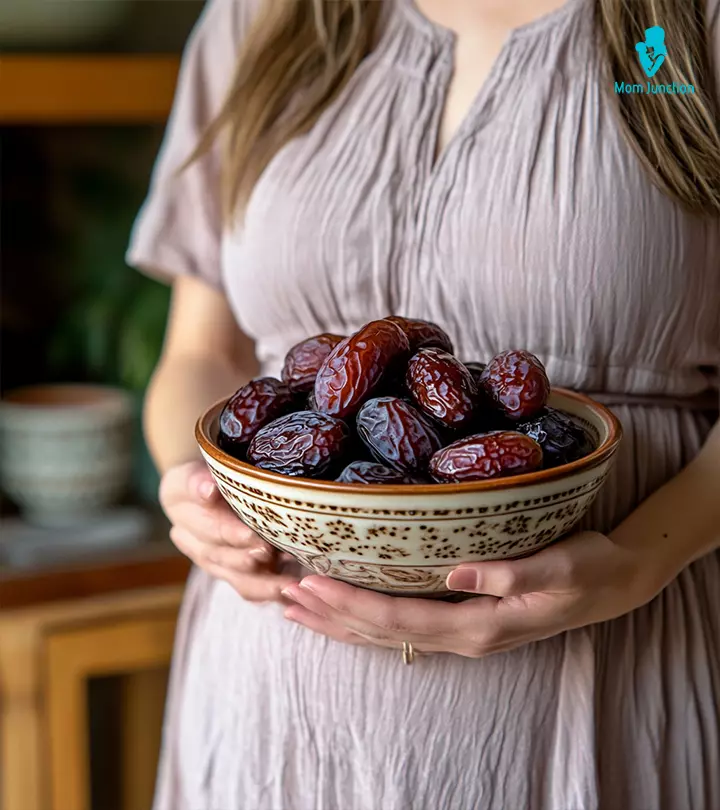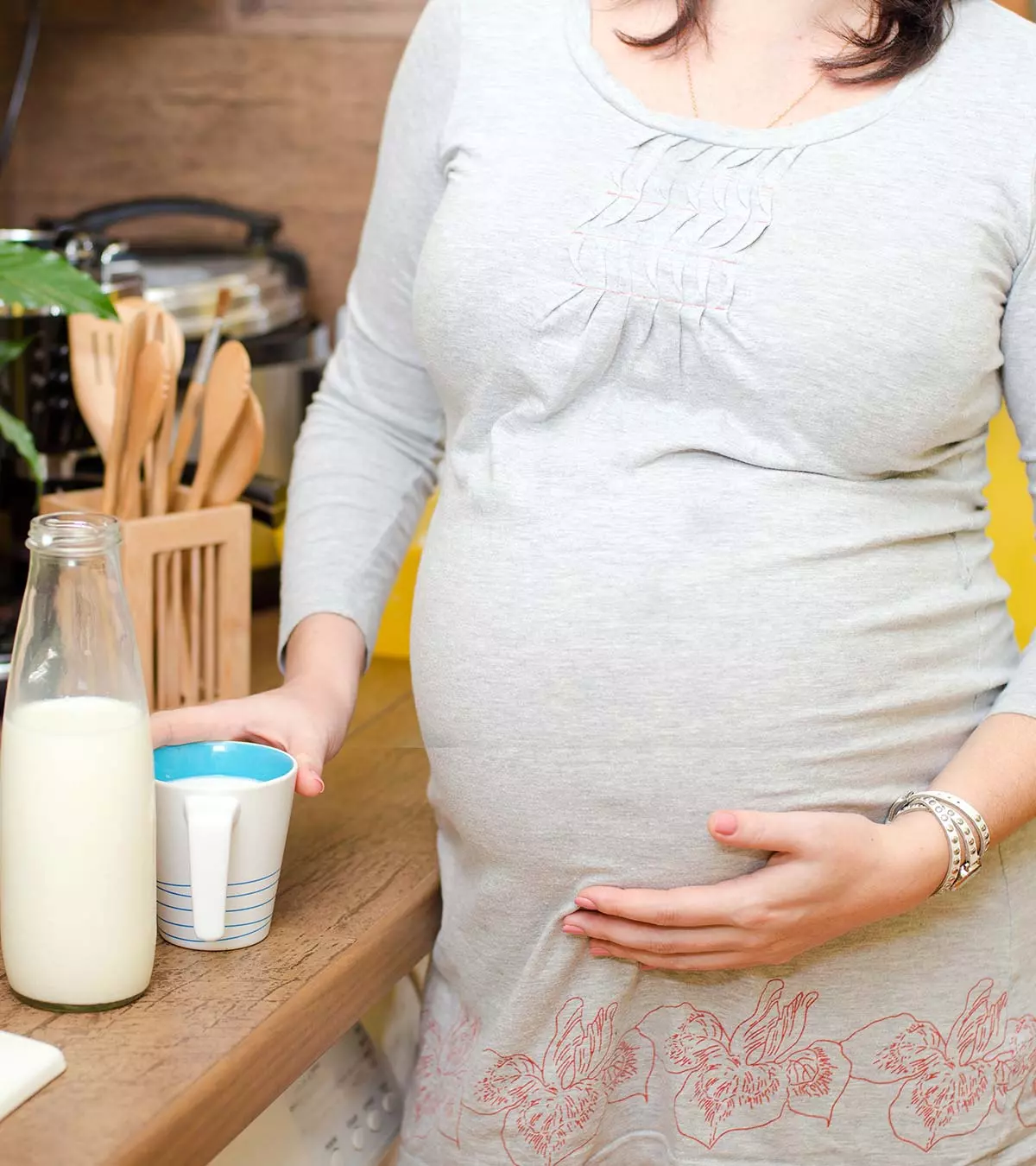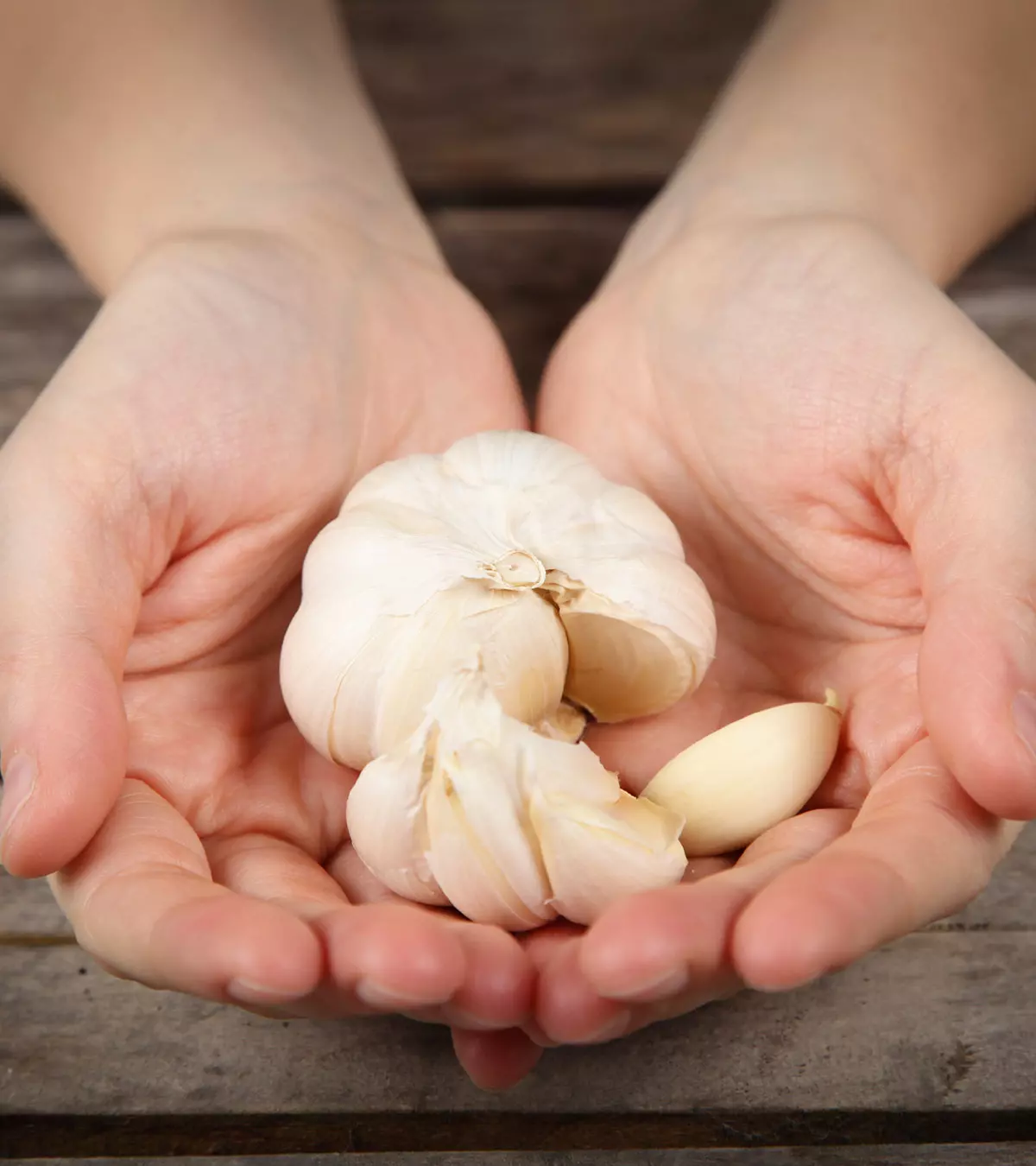
Image: Midjourney/ MomJunction Design Team
Eggplant is highly nutritious and known as the king of vegetables. However, you may wonder if eating eggplant during pregnancy is safe for you and your baby. Some people consider eggplants safe for consumption during pregnancy, while others consider them harmful.

Since eggplants contain important nutrients for fetal development, pregnant women may consume them in small quantities. However, having eggplants in larger quantities may cause side effects in some women.
Read this post for more details about the safety of eggplant for pregnant women, its benefits, ways to include them in your diet, and precautions you should take while consuming them.
Key Pointers
- Eggplant may be consumed in moderation during pregnancy.
- Eggplant contains essential nutrients including vitamins, fiber, folate, potassium, and magnesium.
- Folate in eggplant is important for fetal brain development and can reduce the risk of neural tube defects.
- Eggplant may help regulate sugar levels, support digestion, reduce bad cholesterol, and regulate blood pressure.
- Eating excessive amounts of eggplant during pregnancy may have negative effects such as inducing labor, triggering allergic reactions, and causing digestive issues.
Can You Eat Brinjal During Pregnancy?

Brinjal or eggplant (Solanum melongena) may be eaten during pregnancy but in moderate quantities. It contains several nutrients, such as vitamins and minerals, which could be beneficial for fetal development (1). But you may have to avoid taking it frequently since it is believed to be a heat-producing food and could cause abortion (2).
Nutritional Profile Of Eggplant
Eggplant is low in saturated fats and cholesterol and high in essential nutrients. It contains dietary fiber, vitamin K, thiamin, folate, pyridoxine, potassium, phosphorus, magnesium, and antioxidants. These nutrients are essential to maintain maternal health and support proper prenatal development.
According to the USDA (US Department of Agriculture), about 100g of eggplant contains the following nutrients essential during pregnancy:
| Nutrient | RDA (3) | Per 100g of eggplan (1) |
|---|---|---|
| Total folate | 600µg | 22µg |
| Dietary fiber | 28g | 3g |
| Potassium | 2900mg | 229mg |
| Magnesium | 350-360mg | 14mg |
| Phosphorus | 700mg | 24mg |
The vitamin composition is around 0.039mg thiamin, 0.084 pyridoxine, 22mcg folate, and 3.5mcg vitamin K (1).
How Eggplant Might Be Beneficial During Pregnancy
Eggplant is nutritious and could provide the following health benefits.
- Contains folate: It provides folate, which is important for the development of the brain and cognitive abilities in the baby. It could, therefore, reduce the risk of neural tube defectsiCongenital disabilities of the central nervous system, usually occurring during the early weeks of pregnancy. and helps in the development of red blood cells (4).
- Helps regulate sugar levels: Eggplant is said to control the rise in sugar levels. This could help, especially if you have a risk of gestational diabetesiA condition characterized by elevated blood sugar levels due to hormonal and physical changes in pregnancy. (5). According to a study conducted by the US Centres for Disease Control and Prevention (CDC), every year, two to ten percent of pregnancies in the US are affected by gestational diabetes. Expecting mothers can manage their sugar levels by including healthy foods in their pregnancy diet.

- Supports digestion: The dietary fiber in eggplant could help in relieving constipation and improving nutrient absorption (6).
- Reduces bad cholesterol: It is believed to reduce the harmful cholesterol levels and increase good cholesterol levels in your blood.
- Regulates blood pressure: BioflavonoidsiNatural chemicals primarily found in plant-based products known to possess therapeutic properties. present in eggplant are likely to control blood pressure. In addition, they also help in relieving stress and prevent blood clots (7).
- Antioxidant properties: Eggplant contains antioxidants that help reduce oxidative stress and inflammation during pregnancy, promoting better maternal health (7).
Despite its benefits, sometimes eggplant may not be the best vegetable to have during pregnancy. Let’s see why.
Reasons To Avoid Brinjal During Pregnancy
Ayurveda practitioners believe that you should avoid brinjal in pregnancy in excess quantities as it could have some side effects. However, there are no research studies to support most of the below claims.
- Eggplant contains phytohormonesiChemicals produced by plants that aid in their growth and development. that have menstruation-stimulating properties. Eating brinjal in excess amounts is believed to induce labor, write Karta Purkh Singh Khalsa and Michael Tierra in their book The way of Ayurvedic Herbs.
- In areas where eggplants are cultivated, the soil is thought to contain toxoplasmosisi An infection caused by the parasite Toxoplasma gondii, which is transmitted by raw meat and exposure to cat feces. that could pass to the pregnant woman and her baby through the vegetable. Toxoplasmosis could increase the risk of premature delivery.
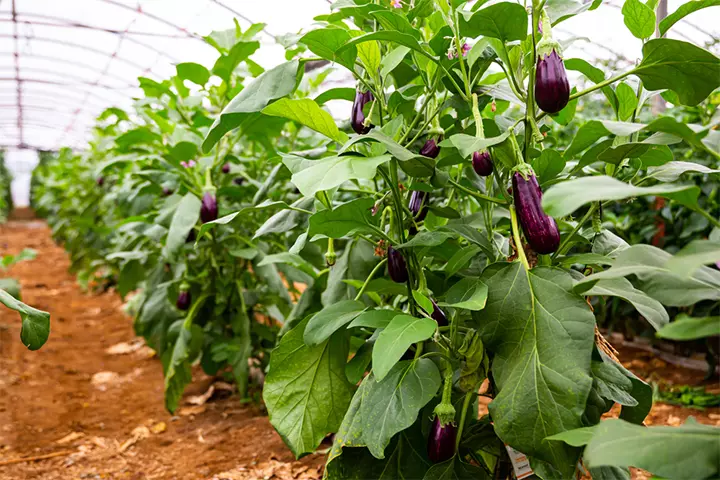
- It may also trigger allergic reactions such as itchiness on the lips, arms, and legs, diarrhea, hives, stomach pain, and cough.

- Raw or undercooked brinjal may cause digestive issues and allergies (8).
 Trivia
TriviaBrinjals are better and tastier when cooked and eaten fresh. There are a few more things to consider while picking the veggie.
Things To Consider While Choosing Eggplant
Choose fresh eggplants as stale ones may ruin your meal.
- Take the small eggplants as they are tastier and fresh. Mature ones turn bitter.
- The skin should be smooth and shiny.
- Avoid the ones that have cuts, blemishes, shriveling, wrinkles, or uneven color.
- Eggplants with holes are likely to have worms – so check thoroughly and avoid them.
- When you press the vegetable, if it forms depression, it means the eggplant is not fresh.
- The stem should be bright green and firm.
- Wash them thoroughly before you cook to avoid bacteria or parasites that may reside on the surface.
- Cook the vegetable thoroughly as undercooked brinjal could lead to digestive problems.
 Quick tip
Quick tipEggplant is one vegetable that can be cooked in multiple ways.
Ways To Include Eggplant In Your Pregnancy Diet
When eggplant or aubergine is cooked properly, it could be really palatable. You can add it to your diet in many ways.
- Stuff the brinjal with your favorite puree to make a curry and eat with rice.
- Stir fry along with other vegetables.
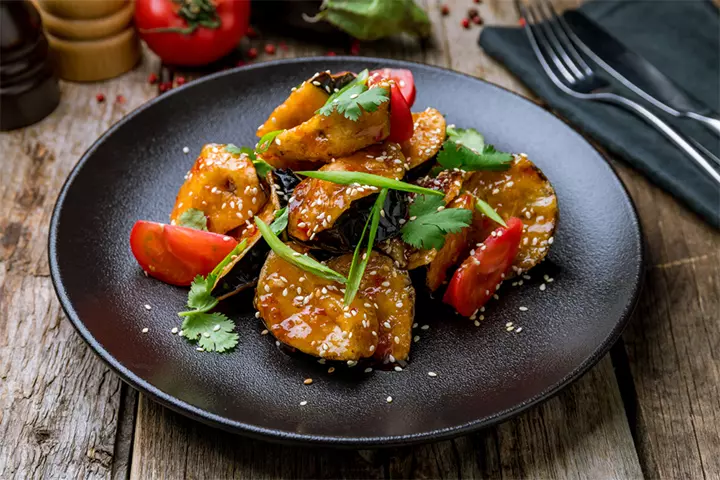
- Cook as a filling for a sandwich.
- Roast, peel, and serve over pasta or bread.
- Bake and serve with other vegetables.
- Make pickles or add to soups.
 Point to consider
Point to considerFrequently Asked Questions
1. Are there any alternative forms of eggplant that are safe to consume during pregnancy?
Eggplant extract is available as capsules or as topical oils and creams. However, such products should not be used during pregnancy without consulting your doctor.
2. How much eggplant can you safely eat during pregnancy?
There is no recommended amount of eggplants to be consumed during pregnancy. Eggplants contain histamine and may cause allergic reactions if consumed in large amounts. Additionally, they contain other allergens (11). Therefore, eggplants should be consumed in moderation during pregnancy.
3. Is there any difference between eating cooked eggplant versus raw eggplant?
It is better to cook vegetables such as eggplant before eating during pregnancy as it reduces the risk of bacterial and parasitic infections. Eating raw vegetables during pregnancy may also upset your digestive system.
Eggplant during pregnancy, due to its nutritional composition, can provide various benefits such as fetal brain development, aiding easy digestion, and maintaining pregnancy blood pressure. You are often advised to include vegetables in your pregnancy diet for a healthy and complication-free pregnancy. However, anything taken in excess quantity may induce side effects. Therefore, as long as you eat eggplant in moderation during pregnancy and follow the hygiene tips, it is healthy for pregnant women. You may also experiment with different recipes to make it even tastier.
Infographic: Reasons To Eat And Limit Eggplant During Pregnancy
Eggplant is typically a healthy vegetable to include in one’s diet. But just as with any other food, eggplant during pregnancy must be taken cautiously to enjoy the benefits without inviting complications. So here are the benefits of eating this vegetable and reasons to limit its intake during pregnancy. Illustration: Momjunction Design Team
Illustration: Should You Avoid Eggplant (Brinjal) During Pregnancy?
_during_pregnancy_illustration.jpg.webp)
Image: Dall·E/MomJunction Design Team
References
1. Eggplant, raw; Basic Report; USDA
2. Sreetama Chakrabarti and Abhik Chakrabarti; Food taboos in pregnancy and early lactation among women living in a rural area of West Bengal; J Family Med Prim Care (2019)
3. Pregnancy and Lactation; Linus Pauling Institute | Oregon State University
4. Folate; The National Acadamies Press
5. National guidelines for diagnosis & management of gestational diabetes mellitus; Maternal Health Division | Ministry of Health and Family Welfare (2014)
6. Elyse Cloeter; 4 ways fiber benefits your health; The University of Michigan School of Public Health (2017)
7. Food of the Month: Eggplant; Beaumont
8. Bheemanapalli N Harish Babu and Yeldur P Venkatesh; Clinico-immunological analysis of eggplant (solanum melongena) allergy indicates preponderance of allergens in the peel; World Allergy Organ J (2009)
9. Eggplant; University of Illinois Extension
10. What can I do about bitter eggplant?; Exploratorium
11. Bheemanapalli N Harish Babu and Yeldur P Venkatesh; Clinico-Immunological Analysis of Eggplant (Solanum melongena) Allergy Indicates Preponderance of Allergens in the Peel; World Allergy Organization Journal (2009)
Community Experiences
Join the conversation and become a part of our nurturing community! Share your stories, experiences, and insights to connect with fellow parents.
Read full bio of Huda Shaikh
Read full bio of Rebecca Malachi
Read full bio of Swati Patwal
Read full bio of Lorraine Teron






